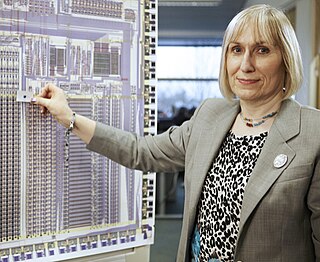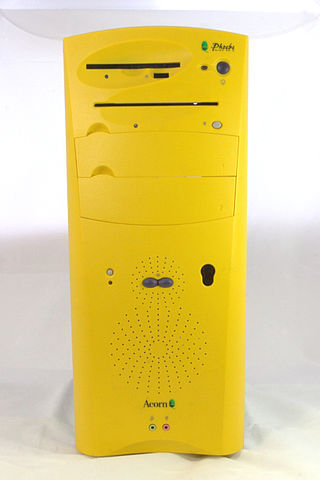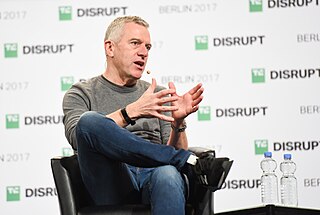
MIPS Tech LLC, formerly MIPS Computer Systems, Inc. and MIPS Technologies, Inc., is an American fabless semiconductor design company that is most widely known for developing the MIPS architecture and a series of RISC CPU chips based on it. MIPS provides processor architectures and cores for digital home, networking, embedded, Internet of things and mobile applications.

Acorn Computers Ltd. was a British computer company established in Cambridge, England, in 1978. The company produced a number of computers which were especially popular in the UK, including the Acorn Electron and the Acorn Archimedes. Acorn's BBC Micro computer dominated the UK educational computer market during the 1980s.

Sophie Mary WilsonDistFBCS is an English computer scientist, a co-designer of the Instruction Set for the ARM architecture.
ARM is a family of RISC instruction set architectures (ISAs) for computer processors. Arm Ltd. develops the ISAs and licenses them to other companies, who build the physical devices that use the instruction set. It also designs and licenses cores that implement these ISAs.

RISC OS is a computer operating system originally designed by Acorn Computers Ltd in Cambridge, England. First released in 1987, it was designed to run on the ARM chipset, which Acorn had designed concurrently for use in its new line of Archimedes personal computers. RISC OS takes its name from the reduced instruction set computer (RISC) architecture it supports.

The Phoebe 2100 was to be Acorn Computers' successor to the RiscPC, slated for release in late 1998. However, in September 1998, Acorn cancelled the project as part of a restructuring of the company.

CA Technologies, Inc., formerly Computer Associates International, Inc., and CA, Inc., was an American multinational enterprise software developer and publisher that existed from 1976 to 2018. CA grew to rank as one of the largest independent software corporations in the world, and at one point was the second largest. The company created systems software that ran in IBM mainframe, distributed computing, virtual machine, and cloud computing environments.

Silicon Fen or the Cambridge Cluster is a collective name given to high tech businesses focused on software, electronics, and biotechnology, including Arm and AstraZeneca, in and around the city of Cambridge in England.

Broadcom Corporation was an American fabless semiconductor company that made products for the wireless and broadband communication industry. It was acquired by Avago Technologies for $37 billion in 2016 and currently operates as a wholly owned subsidiary of the merged entity Broadcom Inc.

Hermann Maria Hauser, KBE, FRS, FREng, FInstP, CPhys is an Austrian entrepreneur, venture capitalist and inventor who is primarily associated with the Cambridge technology community in England.
VLSI Technology, Inc., was an American company that designed and manufactured custom and semi-custom integrated circuits (ICs). The company was based in Silicon Valley, with headquarters at 1109 McKay Drive in San Jose. Along with LSI Logic, VLSI Technology defined the leading edge of the application-specific integrated circuit (ASIC) business, which accelerated the push of powerful embedded systems into affordable products.
In electronic design, a semiconductor intellectual property core, IP core or IP block is a reusable unit of logic, cell, or integrated circuit layout design that is the intellectual property of one party. IP cores can be licensed to another party or owned and used by a single party. The term comes from the licensing of the patent or source code copyright that exists in the design. Designers of system on chip (SoC), application-specific integrated circuits (ASIC) and systems of field-programmable gate array (FPGA) logic can use IP cores as building blocks.

Broadcom Inc. is an American multinational designer, developer, manufacturer, and global supplier of a wide range of semiconductor and infrastructure software products. Broadcom's product offerings serve the data center, networking, software, broadband, wireless, storage, and industrial markets. As of 2023, some 79 percent of Broadcom's revenue came from its semiconductor-based products and 21 percent from its infrastructure software products and services.
Virata Corporation is an inactive acquired company that was a major contributor to the "Cambridge Phenomenon" or Silicon Fen high-tech cluster in the United Kingdom. Case studies and research papers have been created to illustrate the role of social networking in the creation of Virata's success. There is also research available on the role the company played in Silicon Valley venture networks.

Arm Holdings plc is a British semiconductor and software design company based in Cambridge, England, whose primary business is the design of central processing unit (CPU) cores that implement the ARM architecture family of instruction sets. It also designs other chips, provides software development tools under the DS-5, RealView and Keil brands, and provides systems and platforms, system-on-a-chip (SoC) infrastructure and software. As a "holding" company, it also holds shares of other companies. Since 2016, it has been majority owned by Japanese conglomerate SoftBank Group.
NCOS is the graphical user interface-based operating system developed for use in Oracle Corporation's Network Computers, which are discontinued. It was adapted by Acorn Computers from its own RISC OS, which was originally developed for their range of Archimedes desktop computers. It shares with RISC OS the same 4 MB ROM size and suitability for use with TV displays.
RISC OS, the computer operating system developed by Acorn Computers for their ARM-based Acorn Archimedes range, was originally released in 1987 as Arthur 0.20, and soon followed by Arthur 0.30, and Arthur 1.20. The next version, Arthur 2, became RISC OS 2 and was completed and made available in April 1989. RISC OS 3 was released with the very earliest version of the A5000 in 1991 and contained a series of new features. By 1996 RISC OS had been shipped on over 500,000 systems.

Stan Boland is a British entrepreneur in the information technology sector.












